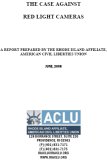Article from: www.thenewspaper.com/news/24/2419.asp
6/12/2008
Rhode Island: ACLU Report Shows Red Light Camera Flaws
ACLU of Rhode Island report shows the city of Providence failed to demonstrate any benefit from its red light camera program.
 A report released yesterday by the Rhode Island chapter of the American Civil Liberties Union (ACLU) argued that the state's only red light camera operation has been a complete failure. In 2005, supportive lawmakers narrowly passed a law authorizing photo ticketing after agreeing to include a sunset provision that would invalidate the law in July 2008. With the deadline looming, supporters are scrambling to save the program. On Tuesday, the state Senate Judiciary Committee voted to make the photo ticketing authorization permanent. The full state House voted 35 to 23 to approve a similar measure on May 8. The ACLU's report is designed to give lawmakers a reason to re-think this course of action.
A report released yesterday by the Rhode Island chapter of the American Civil Liberties Union (ACLU) argued that the state's only red light camera operation has been a complete failure. In 2005, supportive lawmakers narrowly passed a law authorizing photo ticketing after agreeing to include a sunset provision that would invalidate the law in July 2008. With the deadline looming, supporters are scrambling to save the program. On Tuesday, the state Senate Judiciary Committee voted to make the photo ticketing authorization permanent. The full state House voted 35 to 23 to approve a similar measure on May 8. The ACLU's report is designed to give lawmakers a reason to re-think this course of action.
"Expensive. Ineffective. Inefficient. Intrusive of civil liberties. These are just a few ways to describe the Automated Traffic Violation Monitoring Systems, more commonly known as red light cameras," the ACLU report stated.
The report focused on five major problems with the program. The first is that the system is so expensive that the city of Providence ends up writing a large check each month to Affiliated Computer Services (ACS), the for-profit vendor in charge of ticketing. Combined with the lack of data showing the system has produced any safety benefits, the ACLU was left labeling the city's insistence on keeping the program "baffling."
Accidents in Providence increased from 2006 to 2007 at intersections where red light cameras were in use, but the city has held back the data which would allow analysis of accidents at these locations prior to camera installation. The report also charged that even when Providence provided numbers, they were not useful.
"Anyone attempting to analyze the city's data in any meaningful way is left scratching his or her head," the report stated. "It quickly becomes apparent that the numbers given cannot be trusted because they simply don't add up, making it impossible to come to any scientifically significant -- or even correlational -- conclusions."
The report showed that only 40 percent of intersection photographs taken actually resulted in citations being mailed. The city used a statistical trick -- counting only "controllable factors" -- to claim an 87 percent issuance rate. This ensured Providence exceeded the 70 percent minimum required by state standards. Finally, the report argued that photo ticketing represents a dilution of the due process rights of citizens because the owners of cars, not drivers, receive tickets weeks after a violation is issued, making it difficult to mount an effective challenge.
With these five main problems in mind, the ACLU urged the legislature to drop plans to renew the program.
"Such failures should not be rewarded, especially in light of the civil liberties incursions implicit in the implementation of a red light camera system," the report concluded. "The General Assembly should reject efforts to repeal the statutory sunset clause, and should instead let this failed experiment come to a graceful end."
The original Senate legislation to extend the life of the red light camera program included a provision specifically designed to force Providence to switch vendors from Dallas-based ACS to Providence-based Nestor Inc. The provision was dropped in committee.
A full copy of the report is available in a 1.3mb PDF file at the source link below.
Source: The Case Against Red Light Cameras (ACLU of Rhode Island, 6/11/2008)
Permanent Link for this item
Return to Front Page
 A report released yesterday by the Rhode Island chapter of the American Civil Liberties Union (ACLU) argued that the state's only red light camera operation has been a complete failure. In 2005, supportive lawmakers narrowly passed a law authorizing photo ticketing after agreeing to include a sunset provision that would invalidate the law in July 2008. With the deadline looming, supporters are scrambling to save the program. On Tuesday, the state Senate Judiciary Committee voted to make the photo ticketing authorization permanent. The full state House voted 35 to 23 to approve a similar measure on May 8. The ACLU's report is designed to give lawmakers a reason to re-think this course of action.
A report released yesterday by the Rhode Island chapter of the American Civil Liberties Union (ACLU) argued that the state's only red light camera operation has been a complete failure. In 2005, supportive lawmakers narrowly passed a law authorizing photo ticketing after agreeing to include a sunset provision that would invalidate the law in July 2008. With the deadline looming, supporters are scrambling to save the program. On Tuesday, the state Senate Judiciary Committee voted to make the photo ticketing authorization permanent. The full state House voted 35 to 23 to approve a similar measure on May 8. The ACLU's report is designed to give lawmakers a reason to re-think this course of action.